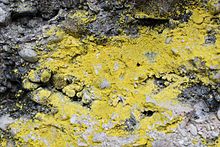Leproplaca chrysodeta
| Leproplaca chrysodeta | |
|---|---|

| |
| Scientific classification | |
| Domain: | Eukaryota |
| Kingdom: | Fungi |
| Division: | Ascomycota |
| Class: | Lecanoromycetes |
| Order: | Teloschistales |
| Family: | Teloschistaceae |
| Genus: | Leproplaca |
| Species: | L. chrysodeta
|
| Binomial name | |
| Leproplaca chrysodeta | |
| Synonyms[1] | |
| |
Leproplaca chrysodeta is a species of saxicolous (rock-dwelling) dust lichen in the family Teloschistaceae.[2] It is found in Europe, the Middle East, and New Zealand.
Taxonomy
[edit]Lichenologist Teuvo Ahti updated the classification of this species in 2015, placing it under the genus Leproplaca.[3] The original name for this lichen was Placodium chrysodetum, first described by Edvard August Vainio in 1921 in both Finnish and German.[4]
The species has had several name changes over the years. It was called Callopisma chrysodetum in 1943 by Veli Räsänen,[5] and later attempts were made for it to be renamed to Caloplaca chrysodeta and Leproplaca chrysodeta, but these changes were not officially accepted due to certain nomenclatural rules (Article 41.8). According to Ahti, most people incorrectly thought Räsänen's 1931 citation was the official first description, but actually, Vainio's description from 1921 is the legitimate starting point. Räsänen's work just referred back to Vainio's original paper.[3]
Ahti corrects this error by acknowledging Vainio's 1921 paper as the true original description, and in doing so, he provides the correct and officially recognized name for this lichen species under the genus Leproplaca. The detailed description by Vainio, written in German, described the lichen's thallus as sorediose (a texture term for lichens), yellow in colour, which turns purplish or bluish-red when the K chemical spot text is applied.[3]
Description
[edit]Leproplaca chrysodeta is characterised by a crust-like covering of powdery spherical granules, each approximately 100 μm in diameter. When mature, these granules coalesce to form a dense, patchy crust that can appear in shades from dull orange-brown to grey-yellow. This crust is not bounded by any distinctive edges or marginal lobes. When tested with a solution of potassium hydroxide (the K spot test) on the surface of the lichen, a purple reaction confirms its identity.[6]
Habitat and distribution
[edit]This lichen typically inhabits limestone cliffs and similar dry, shaded environments with calcareous stones. It often grows over mosses and can also be found on the mortar of walls if they are not in direct sunlight. Leproplaca chrysodeta is widely distributed across the British Isles, throughout many regions in Europe, as well as in the Middle East and New Zealand, where it is a common species.[6]
References
[edit]- ^ "GSD Species Synonymy. Current Name: Leproplaca chrysodeta (Vain.) J.R. Laundon ex Ahti, in Ahti, Kondratyuk, Kärnefelt & Thell, Graphis Scripta 27(1-2): 39 (2015)". Species Fungorum. Retrieved 1 November 2023.
- ^ "Leproplaca chrysodeta (Vain.) J.R. Laundon ex Ahti". Catalogue of Life. Species 2000: Leiden, the Netherlands. Retrieved 1 November 2023.
- ^ a b c Ahti, Teuvo; Kondratyuk, Sergey Y.; Kärnefelt, Ingvar; Thell, Arne (2015). "Nomenclatural corrections and notes on some taxa in the Teloschistaceae (lichenized ascomycetes)". Graphis Scripta. 27: 37–41.
- ^ Vainio, A.E. (1921). "Kaksi kasvitieteellistä tiedonantoa" [Two botanical reports]. Meddelanden af Societas pro Fauna et Flora Fennica (in Finnish). 47: 18–19.
- ^ Räsänen, V. (1943). "Die Flechtenflora von Petsamo. Ein Beitrag zur Kenntnis der Flechtenflora des arktischen Gebietes in Fennoskandien" [The Lichen Flora of Petsamo: A Contribution to the Knowledge of the Lichen Flora of the Arctic Region in Fennoscandia]. Annales Botanici Societatis Zoologicae Botanicae Fennicae "Vanamo" (in German). 18 (1): 1–110 [41].
- ^ a b Fletcher, A.; Laundon, J.R. (2009). "Caloplaca Th. Fr. (1860)". In Smith, C.W.; Aptroot, A.; Coppins, B.J.; Fletcher, F.; Gilbert, O.L.; James, P.W.; Wolselely, P.A. (eds.). The Lichens of Great Britain and Ireland (2nd ed.). London: The Natural History Museum. p. 258. ISBN 978-0-9540418-8-5.
